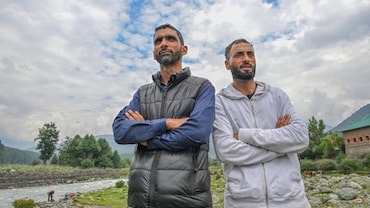The Newspaper Boy
A retired Air Force officer remembers a kind-hearted gesture with gratitude.

Before I could turn 10, I had lost my parents. My (four) brothers and (two) sisters left Hyderabad after being adopted by relatives, but I insisted on staying back as I wanted to continue with my education there. I lived alone in a room that a family member had allowed me to use rent-free: I got this privilege as I was a good student. And to support myself and my education, I had taken to delivering newspapers.
I would be up every morning by 5 a.m. and walk five kilometres from Kachiguda, where I lived, to the newspaper office in Troop's Bazaar. By 6 a.m., I would collect 50 copies of Manzil (Urdu Daily) -- the bundle must have weighed over five kilos. My beat spanned three kilometres, from Moazzam Jahi Market to Basheer Bagh. After distributing the copies, I would rush home -- another three kilometres away -- cook my measly breakfast, eat quickly and be off to the Kachiguda High School. I was in Class VII and even though I had weekly holidays, there was no break from this work.
One wintry Friday morning in 1945, I got home after my deliveries to find a boy of my age at my doorstep. He introduced himself as Afzal and said his father wanted to see me. When I asked him why, Afzal said, "He will tell you."
I did not like his evasive answer. Exhausted after walking around for over 11 kilometres, I was looking forward to breakfast and some rest. This was a treat as it was a Friday. (Before Independence, Fridays were a weekly off in the Nizam's state). I assumed his father wished to subscribe to the newspaper, so I followed him to his place nearby.
A woman in her 40s opened the door. I later learnt she was Afzal's mother Naseem Bano. She looked me over quite intently, then asked me to sit, patted my back and went inside. She reappeared carrying a large tray full of tea and snacks. By now, Afzal's father had joined us. I had noticed the nameplate outside the house: "ABDUL KADER -- Electrical Foreman, Lalaguda Workshops, Nizam's State Railway". Afzal was their only son and a student in my school.
Afzal's mother, Naseem pulled up her chair next to mine and gently asked, "Tell me about your routine, right from the time you wake up in the morning." I wasn't quite sure why she wanted to know this, but I told her about my morning job in a few words. As I spoke to her, I noticed Mr Kader filling up my plate with fruit salad. I protested, but he carried on.It was a sumptuous breakfast, one that brought back memories of happy days spent with my parents and siblings. Later, as I was about to leave after thanking them, Mr Kader asked me to wait and stepped inside the house. Meanwhile, his wife, Naseem, asked me, "How many miles do you walk every day?" I had deliberately omitted the details, but now replied, "A little more than six." (The metric system was introduced nearly 10 years after Independence.)
My reply shocked her. At that moment, I saw Mr Kader emerge again, wheeling a new bicycle. It was a Hercules, an imported brand, quite expensive in pre-Independence India.
"This is for you!" he said.
"But I have no money to pay for it," I cried.
Afzal's mother put her arm around my shoulders, gave a gentle squeeze and said, "Who is asking you to pay for it, my son?"
It took a few seconds for the endearment to sink in. It felt warm, like home, as if my mother were there for me. I didn't even realize when my eyes had welled up, and tears were rolling down my face. She wiped my tears and held me closer.
Mr Kader said, "Your newspaper editor is a friend of mine. He gave me your address, so I knew you lived close by. Then Afzal told us more about you."
Confused, I asked Afzal how he knew so much about me. His reply surprised me. "Everybody, not just in school but the whole of Kachiguda, does!" he said.
So it was possible for people to be curious about someone's plight, yet remain indifferent: This was a revelation to me at that age. But then there were people like Afzal's parents too. I bowed, gratefully, shook hands with Afzal and left. This time I did not have to walk -- I had the bicycle.
The bicycle saved my life for many years thereafter. What's more, this incident taught me an important lesson that has stayed with me all my life: Help should always be need-based. Never try to feed a person who is dying of thirst.
The author joined the Indian Air Force in June 1951 and retired as Flight Lieutenant, VSM. Abdul Kader retired from the Nizam's State Railways (NSR) sometime in the winter of 1951, and the couple left for their hometown near Bezwada (later renamed Vijaywada). Incidentally, the Lalaguda workshops (near Secunderabad Junction) are still operational.






